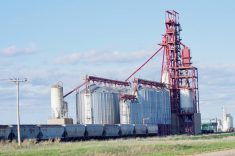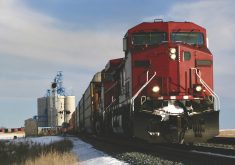Farm groups are redoubling their efforts to get the federal Liberals to move Canadian grain — but their pleas appear to be falling on deaf ears.
Olds-area farmer Jeff Nielsen travelled with other farm leaders to Ottawa at the start of the month in a bid to get the government to crack a whip and get the railways moving more grain to port.
But the group didn’t meet with federal Agriculture Minister Lawrence MacAulay, said Nielsen, who is president of the Grain Growers of Canada.

“He isn’t as in tune on this file as grain producers would like him to be,” he said. “That’s where our frustration lies. Transportation is a key factor when it comes to agriculture and moving our products into position, and that hasn’t resonated with him unfortunately.”
Alarmed by MacAulay’s lack of action, Nielsen and other farm leaders made a public appeal for help at a press conference in Ottawa. Opposition ag critics said they would seek an emergency meeting of the Commons ag committee to “address the worst grain backlog in years.”
However, MacAulay responded by saying he and Transport Minister Marc Garneau “have contacted CN to indicate how serious it is, and that it needs to move grain faster. I have spoken to grain farmers, and indicated to them that we are fully aware of the seriousness of the situation.”
Read Also

Farming Smarter receives financial boost from Alberta government for potato research
Farming Smarter near Lethbridge got a boost to its research equipment, thanks to the Alberta government’s increase in funding for research associations.
At the press conference, Nielsen said the situation sends a big signal to foreign buyers about Canada’s reliability as a grain supplier. The priority is to prevent the kind of grain crisis Western Canada suffered in the winter of 2013-14, the farm leaders said. The then Conservative government resorted to an order-in-council to impose minimum grain movement numbers and stiff fines on the railways to make sure they were respected. The Liberal government did not renew that special cabinet order because measures in its transport modernization bill were designed to achieve stronger shipper protection.
But that bill is currently under study by the Senate transport committee, which has concerns about other sections of the sweeping legislation it’s contained in. Parliament is now on break and Nielsen said it will be mid-April at earliest before it can be passed — with additional time needed for approval of the regulations that will give its provisions teeth.
Meanwhile the Ag Transport Coalition said in its Week 30 report that CN and CP had “the poorest order fulfilment performance to date.”
“CN and CP combined enter Week 31 with 5,383 outstanding orders — a 36 per cent increase (+1,400) from the position entering Week 30 (which ended Feb. 25),” said the coalition’s report.
CN was easily the worst of the two railways, and for the second week in a row delivered only 17 per cent of the rail cars that grain shippers ordered.
The railway’s poor performance appeared to be the main reason for the abrupt exit of CEO Luc Jobin. In announcing his departure on March 5, CN’s board said it “recognizes the immediate operational and customer service challenges the company has been facing since fall 2017 — led by high demand and insufficient network resiliency, coupled with severe winter weather conditions.”
A turnaround can’t come soon enough, said Nielsen, because the cost to Prairie farmers mounts by the day. He sits on a government advisory board called the Crop Logistics Working Group and reports to that group are not good.
“We’re hearing that grain companies are having to put off sales, and they’re not accepting new contracts. And if ships are sitting empty out in the harbour, they’re charging a fee to grain companies that basically gets passed to us in our basis.”
When asked what kind of financial impact that might have on grain growers, Nielsen said, “That’s the million-dollar question. It’s really individual.”

He cited operating lines of credit as an example. He said Farm Credit Canada’s lines of credit expired in the middle of this month and are supposed to be paid off in full by then. But farmers who haven’t been able to deliver grain because of the rail backlog may not be able to do that, said Nielsen.
“So even if your grain is in the bin for the upcoming year, if you haven’t paid off last year’s line of credit, you’re going to get nailed with higher interest rates from that, and you won’t be able to access that credit.”
Young farmers are also vulnerable because their cash flow is usually much tighter, he added.
“Landlords don’t care if you couldn’t move the grain,” said Nielsen. “Come rent day, the rent is due.”
– With staff files















